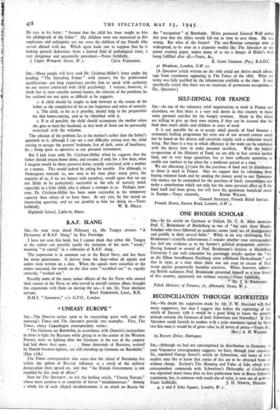Snt,—Many people will have read Dr. Crichton-Miller's letter under the
heading " The Intruding Father " with interest, for his professional qualifications and long experience entitles him to speak with authority on any matter connected with child psychology. I venture, however, to think that in most sensible normal homes, the solution of the problems he has outlined are not quite so difficult as he suggests.
r. A child should be taught to look forward to the return of the father as the completion of his or her happiness and sense of security.
2. The child, so far as is possible, should help in the preparation for that home-coming, and so be identified with it.
3. If at all possible, the child should accompany the mother when she goes to meet her -hnsband, so that both of them can be personally associated with the welcome.
The solution of the problem lies in the mother's rather than the father's approach to it, although I can see a real difficulty arising over the child ceasing to occupy the parents' bedroom, fear of dark, sense of loneliness, . &c. ; being quite as operative as any personal resentment.
But I join issue with Dr. Crichton-Miller when he suggests that the father should return home alone, and assume, if only for a few dayi, what I imagine would be those personal duties usually associated with a mother or a nannie. This would indeed be asking for trouble. For although, as Shakespeare reminds us, one man in his time plays many parts, the majority of us, if we are honest with ourselves, would agree that we are not likely to be particularly successful in the role of nurscry maid, especially to a little child, who is almost a stranger to us. Perhaps, how- ever, Dr. Crichton-Miller has been more successful in his temporary capacity than others of us have been. At any rate, he has raised an interesting question, and we are grateful to him for 'doing so.—Yours


























 Previous page
Previous page